Customer in Focus: Tulla Natives

29 July 2024
Growers' passion: A love for gardening seeds native nursery success
Irrigation is a central element of the Riverina's agricultural output. From rice, cotton, cereals, fruit and vegetable crops to grapes, dairy, sheep, hay and pastures for grazing, this region is renowned for its abundance and diversity of produce.
Marc and Stacey Brooke are one such couple who have wholeheartedly embraced the area's inherent spirit of diversity, with the transformation of their small cropping farm nestled on the outskirts of Wakool into the blossoming Australian natives enterprise, Tulla Natives.
From propagating, planting, cutting and packing, an extraordinary level of activity happens at the couple's Tullakool Road property.
No day looks the same.
One day the pair can be found packing out pallets of their glorious home-grown native floriculture for transporting to Sydney's flower wholesale market; while the next they are heading offsite to plant tens of thousands of seedlings into the ground as part of their contract tree planting service.
Over in their native plant nursery, which grows a large variety of species ranging from Acacia and Eucalyptus to Bottle-trees, Kurrajong, Grevillea and Melaleuca, there are seeds to sow, cuttings to trim and plant, traystock to thin and grade and orders to prepare.
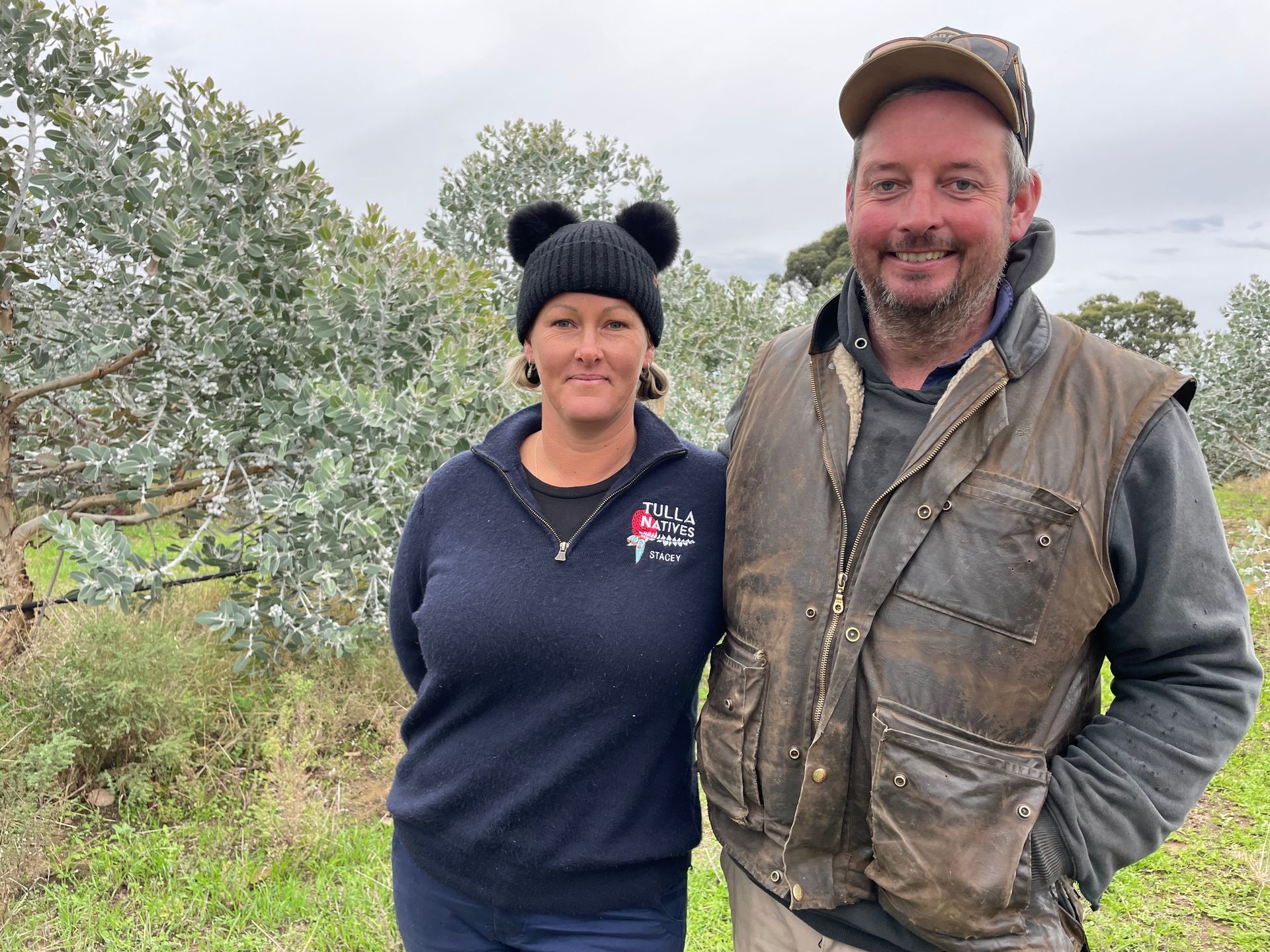
Tulla Natives owners Stacey and Marc Brooke.
There is also a garden centre, which operates most weekends from Autum through to Spring.
The quiet rise of this diverse business stems from the couple's dream of making a living working for themselves doing something they love, combined with hard work, tenacity and a knack for seizing smart opportunities as they arise.
"We have always wanted to run our own business and work for ourselves," Stacey said.
"While it means you have to work twice as long, you also enjoy it twice as much!"
The couple moved to Wakool nine years ago when Marc took a job working on a local farm.
Pursuing a livelihood growing natives was the last thing the pair had in mind at the time.
They purchased their 100-hectare (240 acres) property and turned their hands to cropping while simultaneously working their off-farm jobs. The goal was to eventually transition from part time to full time farmers.
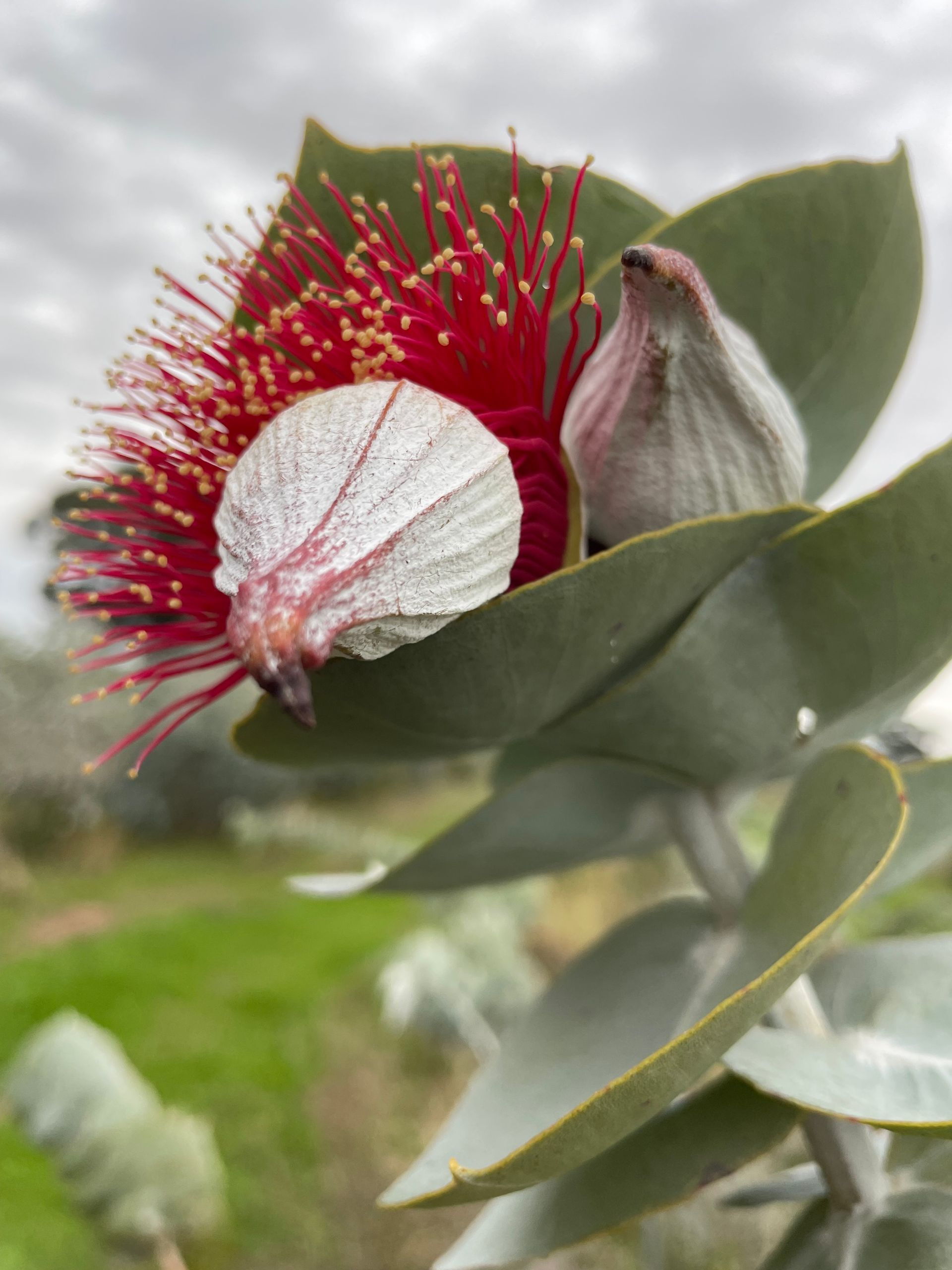
This Eucalyptus Rhodantha starts to reveal its striking red flower.
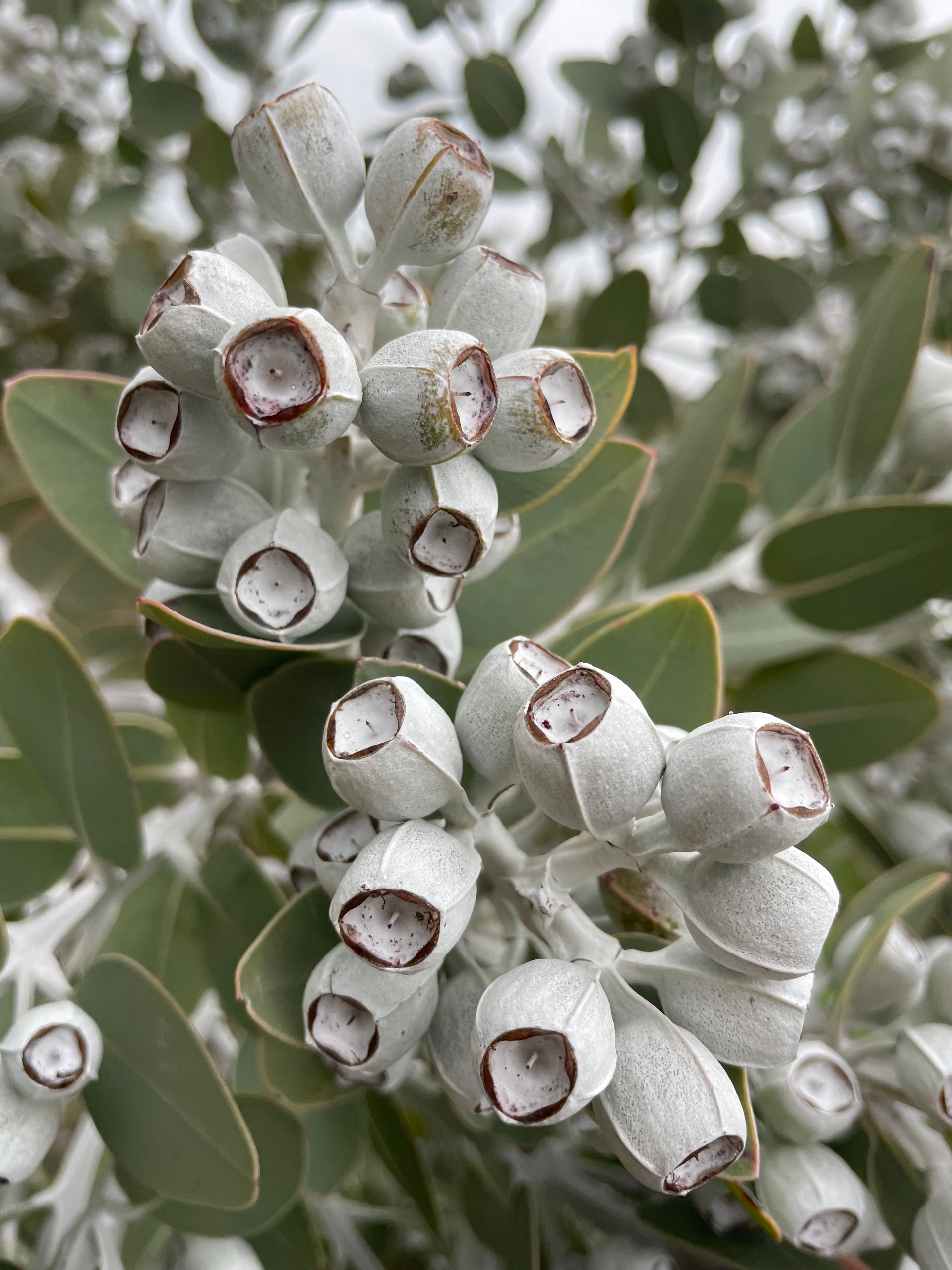
The stunning Eucalyptus Tetragona is a favourite for bridal bouquets.
However, after a year or so, it became clear that small scale crop farming would not provide the financial independence they so craved.
Unperturbed, the indefatigable couple began exploring other alternatives for making a living from their farm and, inspired by their mutual love of gardening and native plants, landed on the concept of establishing a native cut flower and foliage plantation.
Seven years ago, that's where the Tulla Natives story began.
"We built a small shade house, and started growing plants from seed," Marc said.
"We weren't quite sure when we first started where it was all going.
"Initially the idea was to supply a couple of local florists and some local weddings."
Persistence and patience were key as, over the next four years, Marc and Stacey slowly planted out their eight-hectare (20 acres) drip irrigation Australian native plantation.
All this while holding down their day jobs!
"We were working full time for others at the time, so we were planting at night, at the weekend - whenever we could," Stacey said.
"It was a pretty busy time."
The joy the couple derived from germinating their own seeds then sparked another idea for them to pursue.
"We started having some excess trees and thought we could sell them locally," Marc said.
"And then we were like: 'Why don't we start a nursery?'"
Why not!
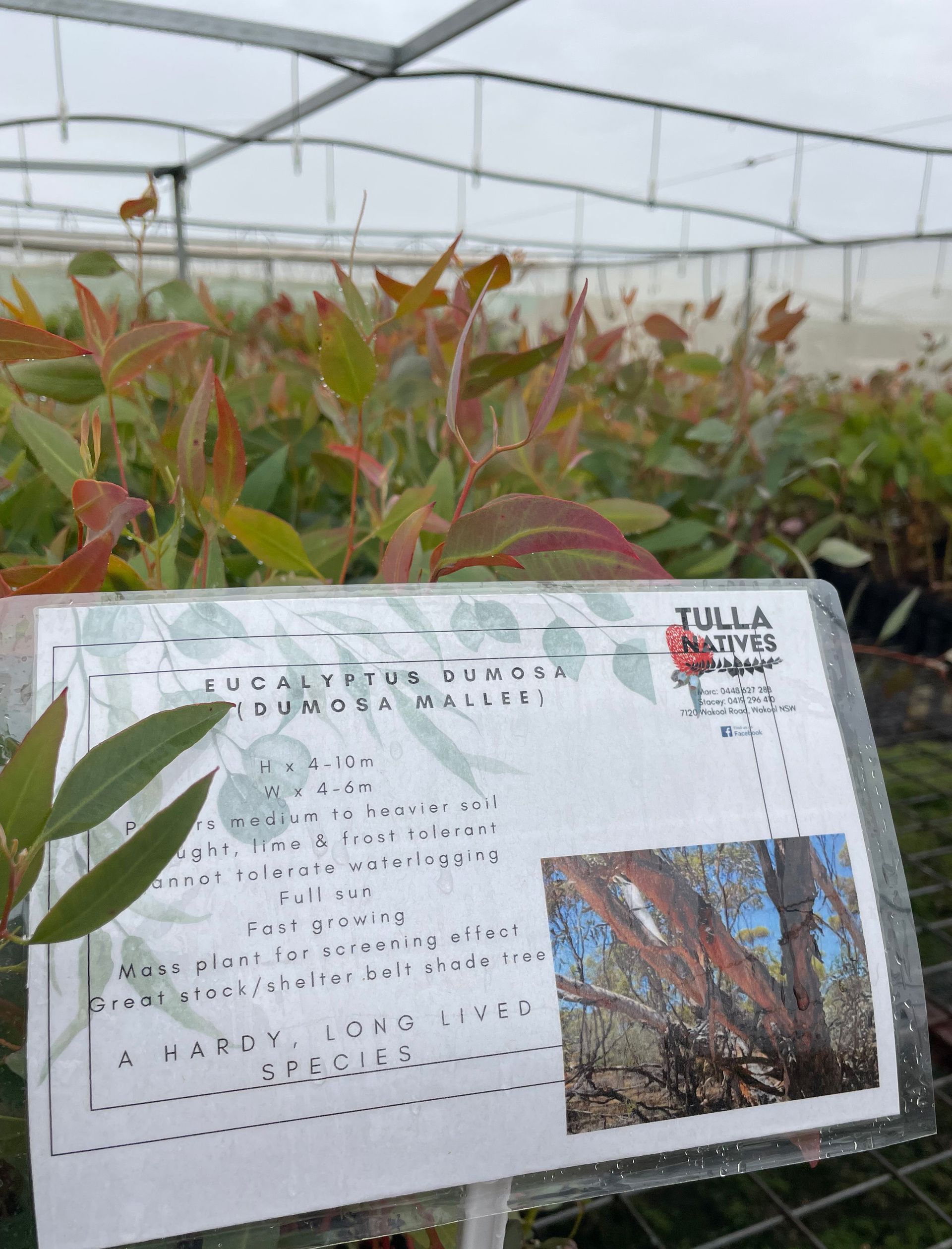
So, as they waited for their floriculture plantation to flourish (some native varieties can take up to five years to become productive), Marc and Stacey launched themselves into developing their retail nursery; which soon morphed into a wholesale business following the pragmatic purchase of a nearby nursery.
"We were visiting a nursery at Cohuna that specialises in trees for revegetation and Landcare projects," Marc explained.
"The owner told us he was selling the business. We thought it through and ended up buying it.
"We shifted all the infrastructure over here - shade houses, benching, seeds and trays - and picked up the clientele list of who he'd been supplying for the last 30 years. That's what threw us into the wholesale tray stock side of things."
But it was a chance meeting four years ago at a local Field Day between Marc and a man named Dustin McCreery that really took the Tulla Natives nursery business to a whole new level.
Dustin is the operator of Western Australia-based tree nursery Chatfields, which holds the national licence to propagate and supply the drought tolerant CSIRO-developed AnamekaTM Saltbush.
"Meeting with Dustin was a pivotal point," Marc said.
"He was looking for an eastern-based nursery that could grow and supply AnamekaTM to the eastern side of Australia."
Tulla Natives has been growing and supplying the fast growing saltbush variety to the eastern states under Chatfield Nursery's national grower licence ever since.
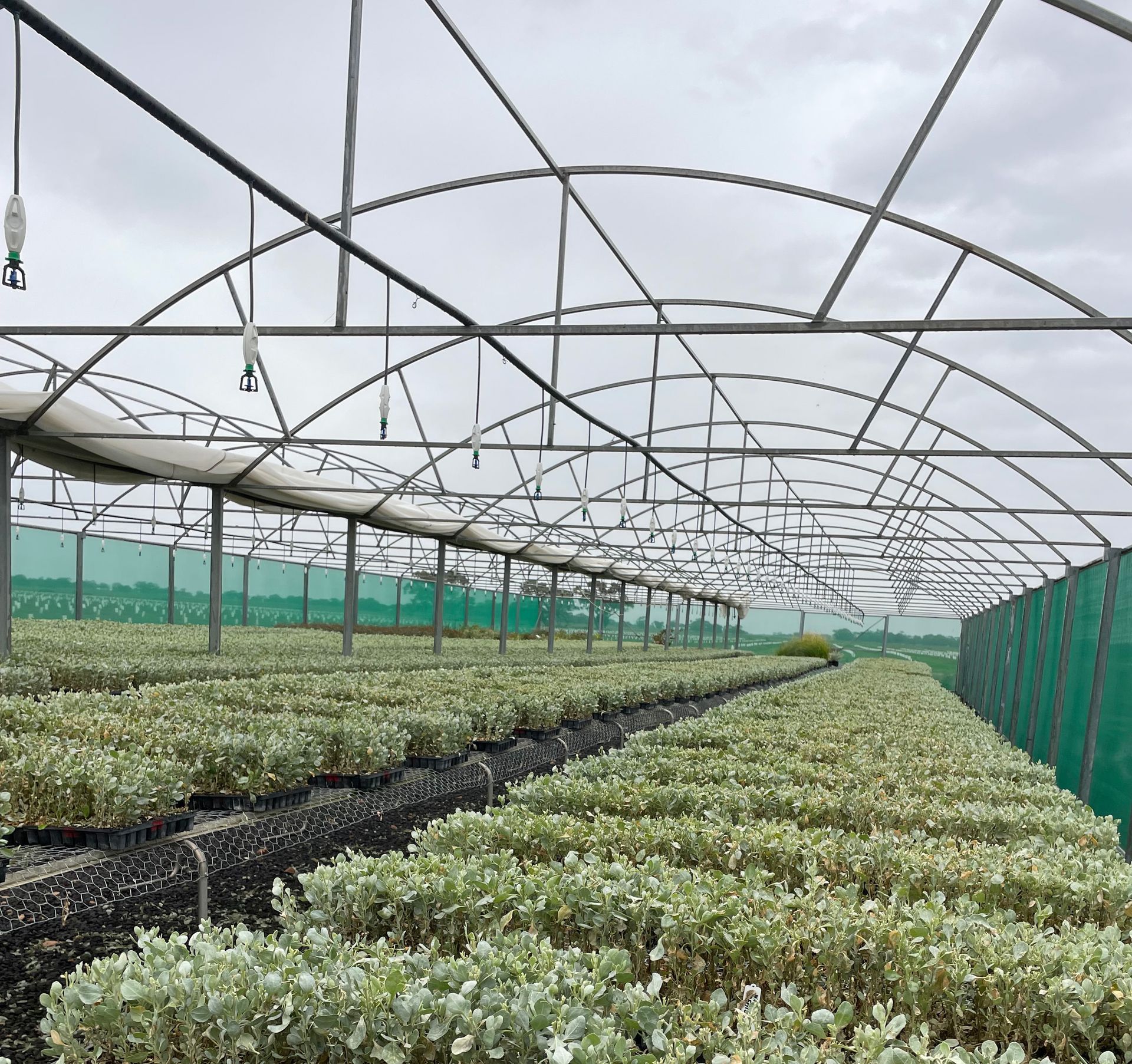
AnamekaTM Saltbush seedlings growing in the Tulla Natives nursery .
CSIRO research shows AnamekaTM has a higher nutritional value than standard saltbushes, and can help regenerate the land. It also thrives on soils that are challenging to grow crops.
Furthermore, it grows at a lower, more accessible level for stock to access and, being less bitter than traditional Old Man Saltbush, the sheep and cattle love eating it!
As Stacey explains, it's like "a big cos lettuce on a bush".
"We grow it from cuttings," she said.
"The goal is to have all the tray stock sold out by the end of Winter - and be ready to start all over again in the Spring."
In their first year of growing AnamekaTM, Tulla Natives raised 25,000 seedlings.
That number reached 300,000 this year, with orders coming in from Victoria, South Australia, Queensland as well as across NSW.
"Demand for AnamekaTM is really starting to grow," Marc said.
"A lot of people are hearing about its benefits and wanting to give it a try."
Their AnamekaTM seedlings constitute a large proportion (around two thirds) of the 250,000 plants that Tulla Natives has put into the ground this year through their contract tree planting operation.
The move into mass planting is the couple's most recent business diversification. Depending on soils and conditions, their planter machine has the capacity to plant around 12,000 per day, with jobs ranging from carbon and revegetation projects to wildlife corridors and feedlot screening.
The couple anticipates this contract planting venture to grow as the demand for carbon offsetting rises.
But what of the cut flower and foliage plantation, the seeds of which they sowed seven years ago?
In true Tulla Natives fashion, it has flourished into a treasure trove of native offerings, from glowing pink Proteas and bright Bottlebrushes to Grevilleas, Hakeas, iconic Banksias and the stunning and highly sought after silver and white Eucalyptus Tetragona.
The couple made the leap from local retail sales to supplying the wholesale market last year after, in yet another moment of serendipity, they struck up a conversation with a flower wholesaler while attending a national flower conference.
"He came out to the farm afterwards, took a look at what we had in the paddock and said: 'Send me the lot'," Stacey said.
"We were pretty chuffed about that!"
Tulla Natives delivers between 200 and 600 bunches of native goodies into the premium Sydney wholesale market each week. From there it ends up in the hands of florists around Australia.
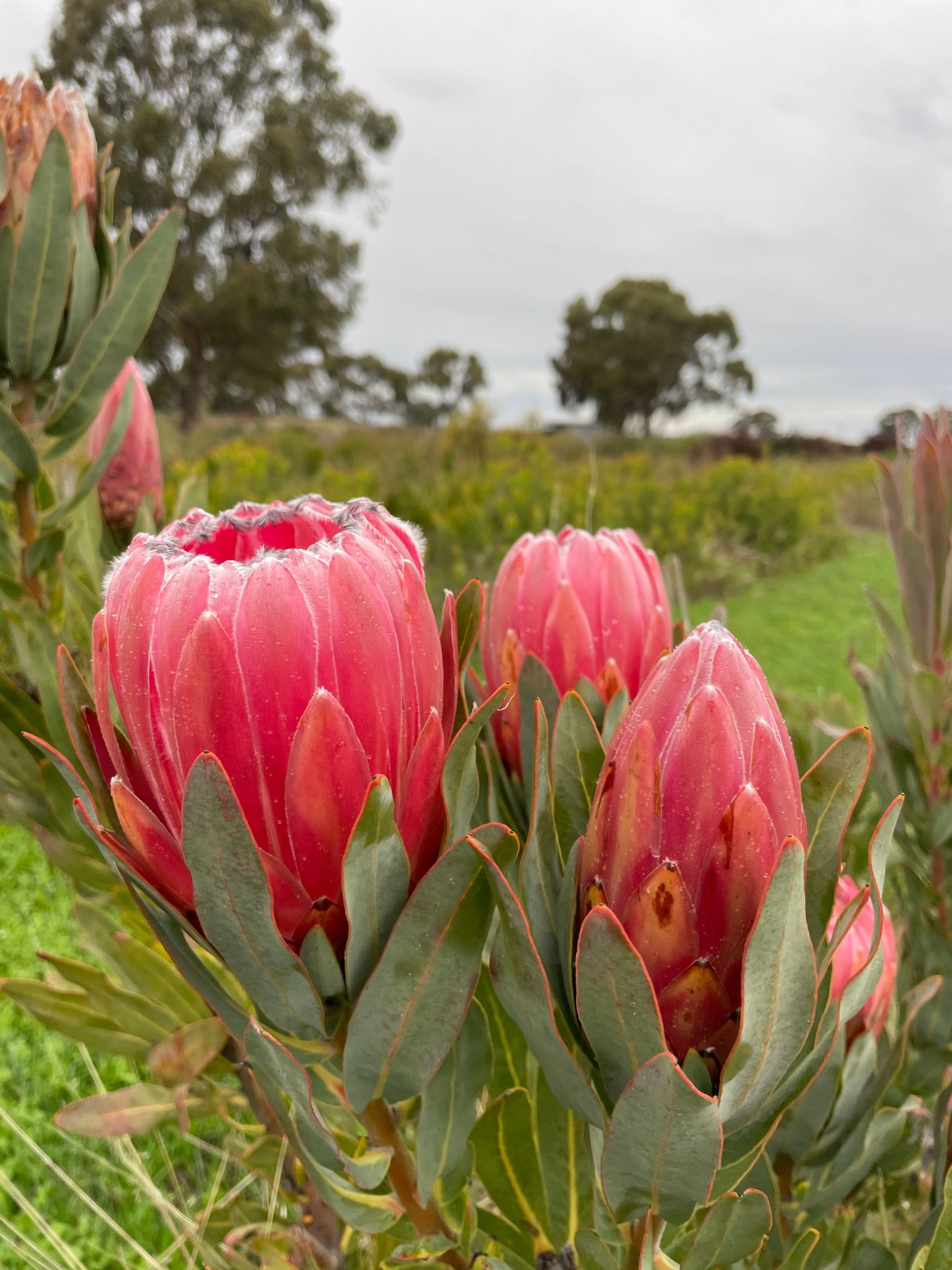
Pretty pink Proteas thrive in the the Tulla Natives plantation.
They have their sights on the export market next.
The business's recent shift from modest local retailer to bulk wholesale flower supplier did not come without its challenges. Stacey and Marc needed to learn rapidly about meeting the strict standards of the cut-flower market.
"We had no idea about the requirements for the wholesale markets," Stacey said with a smile.
"There's no book, no guide. Everyone tells you something different.
"It took us six months to learn how to properly cut the flowers - it has to be all uniform.
"Then there's volume, bunching, stem size, quality and packing requirements.
"Just navigating all that was quite challenging, but now we've nailed it.
"We do it very well; and we're very proud of what we do."
With their gazes ever on the future, Marc and Stacey are continuing to expand their cut flower and foliage plantation. They recently finished hand planting another 14,000 natives across 14 more hectares (35 acres) of their farm; all of which are fed through a further 33 kilometres of drip irrigation line.
This means in a few years' time Tulla Natives will have 22 hectares (55 acres) of productive floriculture for the wholesale flower markets.
"We've learned through trial error and over the past seven years what grows well here and what doesn't," Marc said.
"A lot of the popular floriculture we produce are Western Australian varieties.
"Our climates are quite similar, and the country we've planted up has nice sandy loam soil that provides similar conditions to where they grow naturally in Western Australia.
"The fact we've got access to water (their average yearly water use per hectare is 1.5 megalitres) means we can really push things along and grow a really good product."
In case you haven't guessed, Marc and Stacey are no longer reliant upon off-farm jobs to supplement their incomes and support their dream.
Instead, they are proud employers themselves, with two part time staff on the books. They also engage several casual workers during the Spring and Summer, when their propagating activity is at its peak.
These days they are able to pour all their time, love and energy into their burgeoning enterprise. Tulla Natives is indeed their full time job and 24/7 focus.
* Tulla Natives has been named as a finalist in the 2024 Campaspe Murray Business Excellence Awards in the Best Agri Business category. The winners will be announced on 30 October 2024.
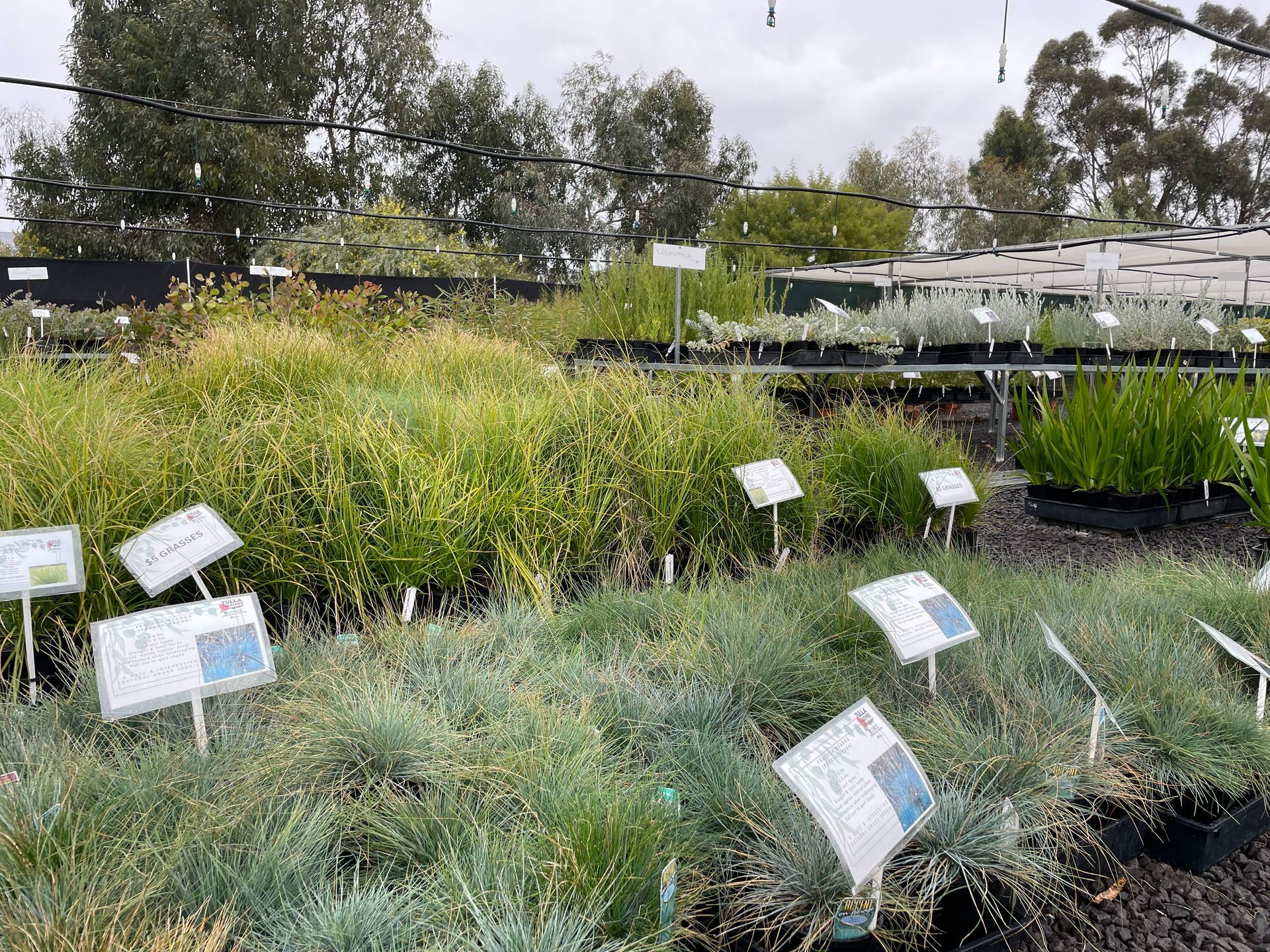
Tulla Natives' garden centre operates most weekend from Spring to Autumn.

About Us
Projects
Customer Resources
Community
News
Other
Legal
Copyright © 2023 Murray Irrigation Pty Ltd
site by mulcahymarketing.com.au
